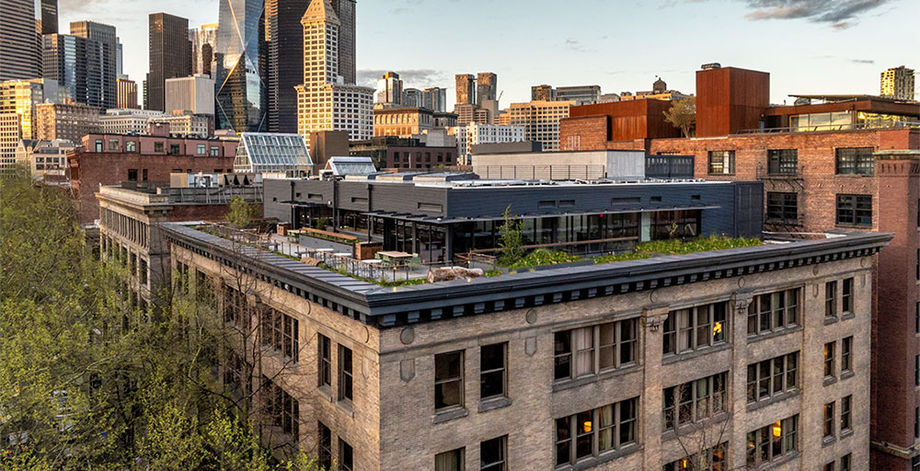 The Populus Seattle's rooftop bar, Firn Photo Credit: ARTXIV
The Populus Seattle's rooftop bar, Firn Photo Credit: ARTXIV
Populus Hotels, a growing collection of climate-positive hotels that celebrate and protect the natural world, has unveiled the Populus Seattle in Pioneer Square. The 120-room property, an adaptive reuse of a 1907 building, plants a tree for every night's stay through the One Night, One Tree program, and its design evokes the natural beauty of a Pacific Northwest rainforest. Populus Seattle joins the 265-room Populus Denver, which debuted last October.
"The opening of Populus Seattle marks an incredibly significant milestone for the future of environmentally forward hospitality — both in Seattle and across the country — providing a lively new gathering place that connects guests and locals to the Pacific Northwest in the heart of the city," said Jon Buerge, president of Urban Villages, which owns the hotel. "As an historic adaptive-reuse property, Populus Seattle underscores Populus Hotels' unwavering commitment to honor and give back to our environment."
Architecture preserves the urban past
The Miller Hull Partnership aimed to preserve the historic essence and charm of the building’s past as the Westland Building. Wherever possible, existing materials were preserved and repurposed, including Douglas fir beams, exposed brick and car decking. In some instances, Miller Hull worked to bring the building back to its original state; for example, elevators added in the 70s were relocated to open up a skylight that now runs from the lobby to the roof, filtering in natural light.
Interior design in nature
Design firm Curioso created the interiors using raw woods and forged steel — often leaving the structural elements exposed to create a balance between raw beauty and refined craftsmanship.
A variety of trees and vegetation fill the property, particularly in the entryway and on the rooftop. "G(host) Forest," a hanging landscape art piece by Isvald Klingels composed of fallen trees, snags, logs, branches and living plants, decorates the vestibule. On the rooftop, native prairie plants support biodiversity by bringing butterflies, hummingbirds and bumblebees back into the city.
Populus Seattle also features a large art collection curated in partnership with ARTXIV, a global art-production house. Among the works are commissions from 35 local, regional and international artists.
Two event spaces are available right off the lobby: The Library and the Art Room welcome business meetings or social gatherings for up to 70 guests, and also host community events and programming.
Sleeping in
The guest rooms have been designed to feel both luxurious and grounded in the beauty of the Pacific Northwest. For VIPs, the Summit Suite is an expansive sanctuary on the top floor with a dining area, a kitchenette, a soaking tub and a private terrace overlooking the city.
Dining in
The hotel features Firn, the first rooftop bar in the neighborhood, along with Salt Harvest, a signature restaurant that draws inspiration from the Pacific Northwest. Both concepts focus on using local seasonal ingredients. The menus have been created by executive chef Conny Andersson, a cookbook author, and veteran of Four Seasons and Six Senses hotels, along with chef de cuisine Jonathan De Paz, an alum of the esteemed French Laundry and Eleven Madison Park restaurants.
The Café at Salt Harvest, serving Monorail Espresso and artisan pastries, aims to be a neighborhood spot where guests and locals can linger.
Eco-conscious hospitality
Populus Seattle is committed to being "carbon positive" — meaning it sequesters more carbon in biomass and soil than it emits through both embodied and operational activities over its full lifecycle. The hotel’s sustainability strategy includes preserving and revitalizing a historic structure, reducing its embodied carbon footprint by 36 percent — the equivalent of 2.2 million miles driven or 492 tons of coal burned. The hotel uses a life-cycle assessment to evaluate the environmental impact of every material, system and process, from construction to decommissioning.
The hotel has partnered with local farms for regenerative practices, and it uses 100 percent renewable electricity and composts all food waste.